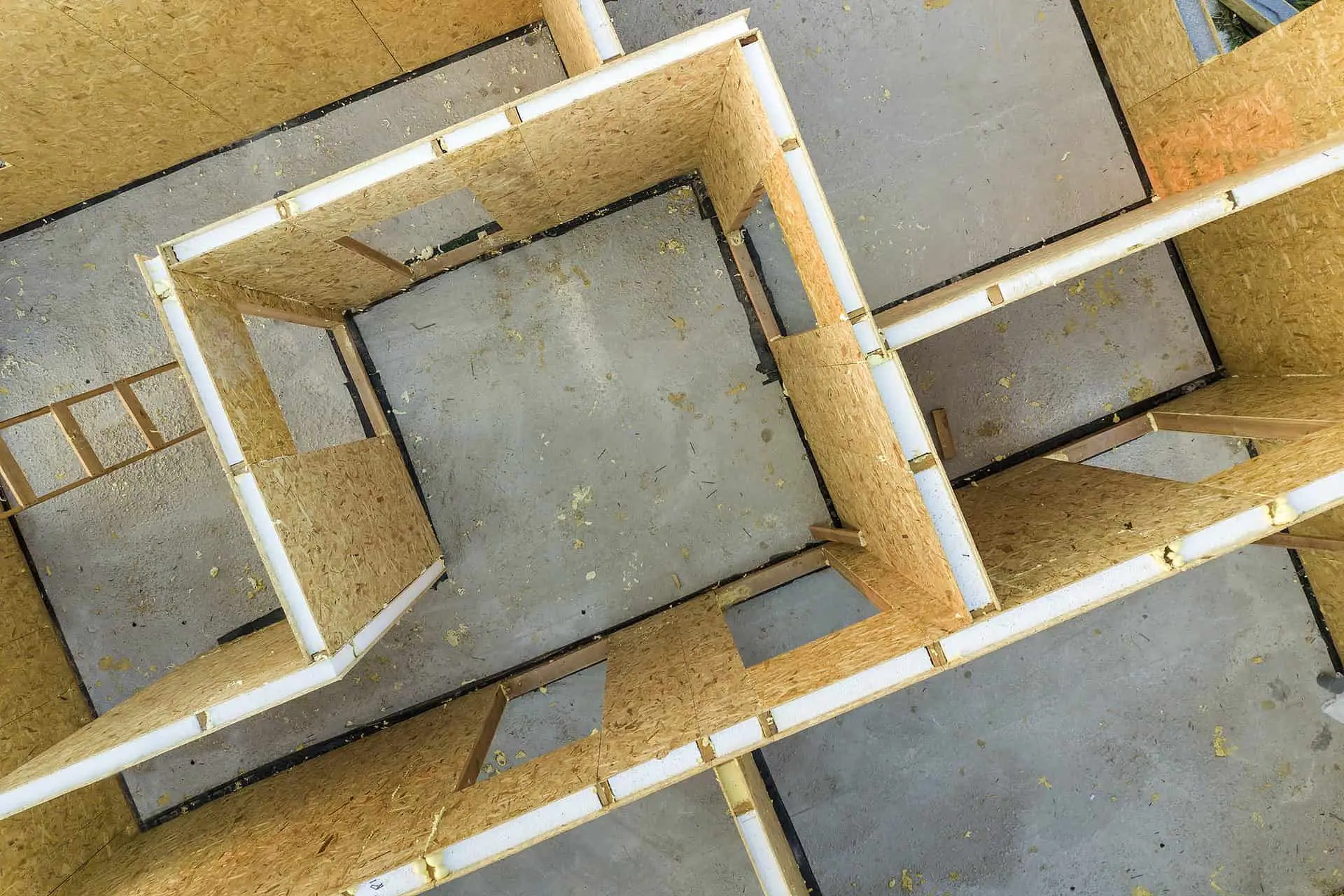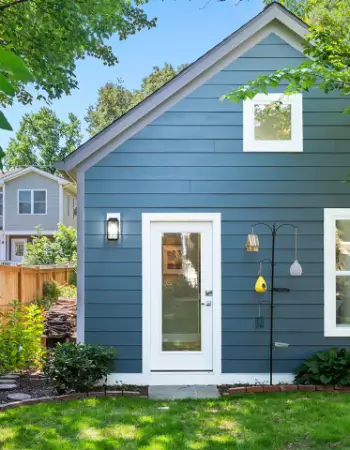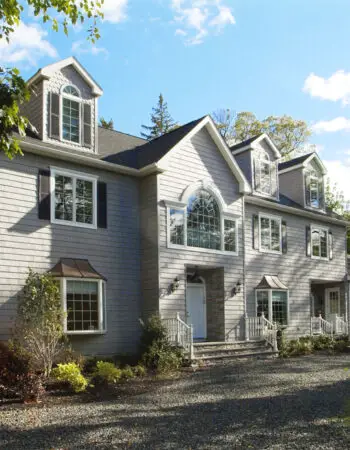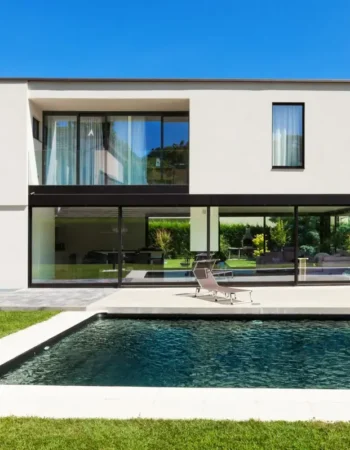Modular homes rarely experience severe issues regarding sound pollution, though they aren’t soundproof by definition. Being built up to the building codes certifies that modular homes satisfy the minimum standards of safety and comfort. However, acoustic comfort isn’t necessarily ensured by these regulations since, in the United States, the residential building codes don’t provide any guidelines regarding outdoor sound insulation. Still, most modular homes are built beyond the building code regulations, applying different construction strategies to improve acoustic comfort.
Ways to improve the sound insulation in a modular home:
- Prioritize sound comfort when defining the distribution layout
- Landscape to keep the noise away
- Soundproof the walls
- Opt for double-glazed windows
- Use fabrics to absorb the sound
Soundproofing a modular home definitely increases the overall construction cost since it requires the acquisition of additional technical materials. However, in some situations, this extra expense is absolutely cost-effective.
Acoustic comfort at home
Excessive noise at home can easily disrupt daily activities, commonly causing insomnia, lack of concentration, and stress [1]. We experience acoustic comfort at home when the volume of noise in our environment isn’t loud enough to disrupt our well-being. While the noise level determining acoustic comfort might vary from person to person, organizations such as the American National Standards Institute (ANSI) have compiled a set of values to help define the values that work for most [2].
The acceptable sound levels at home:
- Bedrooms: From 25 dB to 30 dBA.
- Living rooms: From 30 dB to 35 dBA.
- Home office: From 40 dB to 45 dBA.
- Kitchen, bathrooms, or corridors: Up to 55 dBA.
To ensure acoustic comfort, it is important to identify any possible noise source beforehand. The most disturbing noise sources usually come from outside of the house. Identifying them in an early design stage ensures that the house construction is done with the intention of reducing that disturbance.
How to improve the sound insulation of a modular home
To effectively soundproof your modular home, different design and construction elements need to be taken into consideration. The main goal of each of these approaches is to ensure that the most sound-sensitive areas of the house are kept as silent as possible. It will then be very helpful to identify the origin of the noise you want to avoid in order to apply these strategies effectively.
Prioritize sound comfort when defining the distribution layout
While experiencing noise pollution in a bedroom is definitely frustrating, you may be able to get away with it in areas like the laundry room, the entrance hall, a bathroom, or the garage. When defining the layout for your new modular home, identify the origin of any possible noise pollution source and place those rooms that need a quieter environment farther from them. Keep in mind that noise pollution can come from your own home, so be mindful of separating the quiet areas from laundry rooms, bathrooms, or kitchens. Strategies like placing closets between a noisy and a quiet room can also be beneficial [3].
Landscape to keep the noise away
Most of the noise pollution we experience in our homes comes from outdoor sources, and creating a sound barrier in the yard helps reduce the amount of sound that reaches indoor space. An excellent way to create this sound barrier is by landscaping with plants. Plants, especially dense, evergreen plants and trees, are a good way to keep unwanted noises away since they absorb noise. The most effective sound barrier is that created with a variety of different plants since each one of them can help reduce different frequencies [4].
Soundproof the walls
The most effective way to soundproof a wall is by adding mass, something that can be easily done with materials such as brick or concrete [5]. However, modular construction can’t follow this advice since having to transport the modules from the factory to the property forces this type of construction to opt for lighter wall solutions. An alternative solution is to insulate the walls properly. Mineral or rock wool insulation is a perfect option since it acts like a three-in-one insulation material providing sound reduction, thermal comfort, and fire safety [6].
Opt for double-glazed windows
Windows are openings connecting our indoor spaces with the exterior than can easily filter in more than is desired. Some companies design soundproof windows that are specifically engineered to create a highly effective sound barrier [7]. If, for whatever reason, you cannot install soundproof windows in your modular home, opting for double-glazed windows will help reduce 20% to 65% of the noise levels [8].
Use fabrics to absorb the sound
The way you furnish and decorate your indoor spaces can also contribute to better acoustic comfort. Fabrics are a very effective material with a great capacity to absorb noise that can be particularly effective at reducing outdoor noise when used as curtains. However, adding other fabric elements, such as carpets, can definitely contribute, especially when the fabric used is quite thick and dense.
When should you soundproof a modular home?
Every modular home owner would benefit from taking sound insulation into consideration since a quiet environment is key to improving our well-being. However, the severity of the required soundproofing measures varies enormously depending on the property’s environment. Below are some of the situations that should prioritize sound insulation when building a modular home.
- Your property is nearby noisy transportation lines: If the property where you are building your modular home is nearby a busy road, a rail track, or an airport, for example, soundproofing the house is something you should consider without a doubt.
- There is noise coming from the neighbors: Having neighbors nearby your home increases the chances of noise pollution. This noise can come from multiple sources, such as conversations, kids playing, animals, or gardening tools. Though usually, the more extensive discomfort comes from constant sounds, such as those coming from an air conditioning unit or a pool pump.
- The property is in an area with a development plan: Construction works cause severe noise pollution. If the area of your property is under development, you know that different construction sites will be based around your home.
- There is a nightlife area nearby: Bars, restaurants, and pubs can cause severe noise pollution. Even if the sound seems well insulated and kept indoors, these locations are often surrounded by unwanted noise. Be especially mindful of soundproofing measures if these venues operate at night.
References:
- Clean Air Act Title IV – Noise Pollution EPA – United States Environmental Protection Agency https://www.epa.gov/clean-air-act-overview/clean-air-act-title-iv-noise-pollution
- Architectural Acoustics – Acceptable Room Sound Levels Archtoolbox https://www.archtoolbox.com/room-sound-levels/
- Escott, M. Soundproof your home House Plans Helper https://www.houseplanshelper.com/soundproof-your-home.html
- Fan, Y. and Zhiyi, B. and Zhu, Z. and Jiani, L. (2010). The Investigation of Noise Attenuation by Plants and the Corresponding Noise-Reducing Spectrum. Journal of environmental health. 72. 8-15. https://www.researchgate.net/publication/43344334_The_Investigation_of_Noise_Attenuation_by_Plants_and_the_Corresponding_Noise-Reducing_Spectrum
- Baker, I. (2022, August 27) How to soundproof a wall (the 3 best acoustic wall solutions) 2022 The soundproofing store https://www.soundproofingstore.co.uk/how-to-soundproof-a-wall-the-3-best-acoustic-wall-solutions-2021
- External wall insulation Roockwool https://www.rockwool.com/north-america/products-and-applications/external-wall-insulation/
- Home page Soundproof Windows, Inc. https://www.soundproofwindows.com
- (2022, January 19) How effective is double glazing at reducing noise? Sheerwater Glass https://www.sheerwaterglass.co.uk/blog/how-effective-is-double-glazing-at-reducing-noise/



